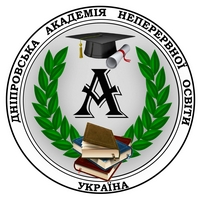DISTANCE LEARNING IN UKRAINE: PROBLEMS AND PROSPECTS
Abstract
Summary. The publication analyzes the problems and prospects of implementing distance learning in Ukraine. The
role of distance education as an important mechanism of informatization and intellectualization of modern society is
revealed. Based on sociological research, the main trends in the development of distance education at the regional level
are shown. The main problems of introduction of distance learning in general educational institutions and institutions of
higher education of Dnipropetrovsk region are revealed. A comparative analysis of the main trends in the introduction
of distance education in Ukraine with global development trends.
Particular attention in this publication is paid to the analysis of the main problems and prospects for the implementation
of distance learning in the Dnipropetrovsk region. The analysis was conducted based on the results of sociological research
of the Dnipro Academy of Continuing Education of the Dnipropetrovsk Regional Council. quarantine conditions. The
results of the research revealed the peculiarities of the introduction of distance learning in the Dnipropetrovsk region
in quarantine, identified technical means, platforms and cloud services used for distance learning and provided an
opportunity to predict further ways to improve the implementation of digital technologies in the educational process
at regional and national levels. The results of the research also provided an opportunity to conduct a comparative
analysis with the results of other sociological studies on the specifics of the introduction of distance learning during the
pandemic during 2019-2021 and identified many typical problems and trends for the formation and further development
of distance education in Ukraine.
References
1. Власенко Л. В. Переваги та недоліки дистанційного навчання. Професійна підготовка педагога : історичний досвід
і виклики сучасності : збірник наукових праць. Дрогобич : Редакційно-видавничий відділ Дрогобицького державного
педагогічно університету ім. І. Франка, 2013. С. 224-228.
2. Закон України «Про вищу освіту» від 01.07.2014 № 1556-VII. URL : http://vnz.org.ua/zakonodavstvo/111-zakonukrayiny-pro-vyschu-osvitu (дата звернення : 27.12.2021).
3. Інститут обдарованої дитини НАПН України. Результати опитування «Виклики дистанційного навчання». 2020.
URL : http://iod.gov.ua/news.php?readmore=427 (дата звернення : 27.12.2021).
4. Концепція розвитку дистанційної освіти в Україні. Київ : КПІ, 2000. 12 с.
5. Концепція розвитку освіти в Україні на період 2015-2025 років (проект) URL : http://osvita.ua/doc/files/news/435/43501/
project_30102014.doc (дата звернення : 27.12.2021).
6. Міністерство та Комітет цифрової трансформації України : 40% українських шкіл не мають якісного підключення
до інтернету (2020, 4 червня). URL : https://thedigital.gov.ua/news/40-ukrainskikh-shkil-ne-mayut-yakisnogo-pidklyuchennyado-internetu (дата звернення : 27.12.2021).
7. Мусієнко О. Л., Зелінська О. В. Дистанційне навчання у вищій школі : моделі і технології. Наука в інформаційному
просторі : матеріали VІІ Міжнар. наук.-практ. конф. 29-30 верес. 2011. Донецьк : Біла К. О., 2011. Т. 2. С. 66-72.
8. Шостак У. В. Види педагогічних технологій. Перспективные разработки науки и техники – 2010 : материалы
Международной научно-практической конференции, Польща, 7-15 ноября 2010. URL : http://www.rusnauka.com/
31_PRNT_2010/Pedagogica/74052.doc.htm (дата звернення : 27.12.2021).
9. Ткаченко Т. Названа найбільша проблема дистанційного навчання. URL : https://myc.news/ua/obshestvo/nazvana_
samaya_bolshaya_problemadistancionnogo_obucheniya (дата звернення : 27.12.2021).
10. Хассон В. Дж., Вотермен Е. К. Критерії якості дистанційної освіти. Вища освіта. 2004. № 1. С. 92-99.

 ISSN
ISSN  ISSN
ISSN 

